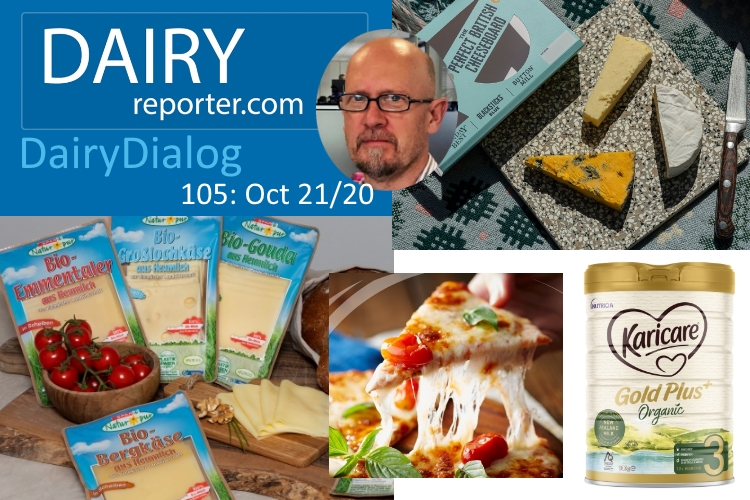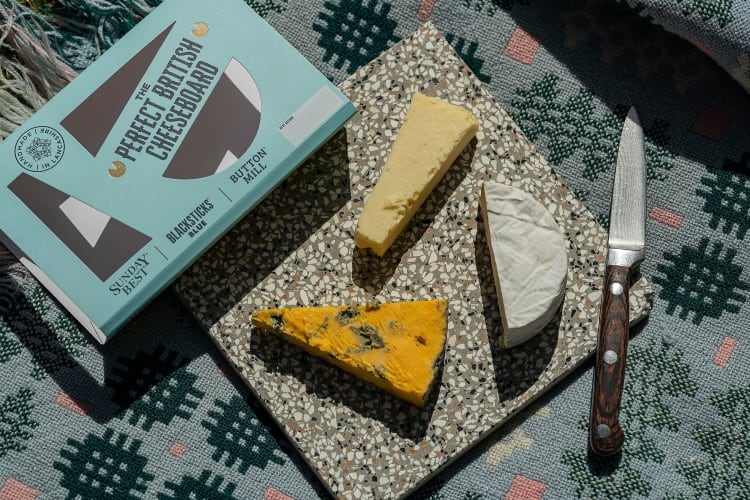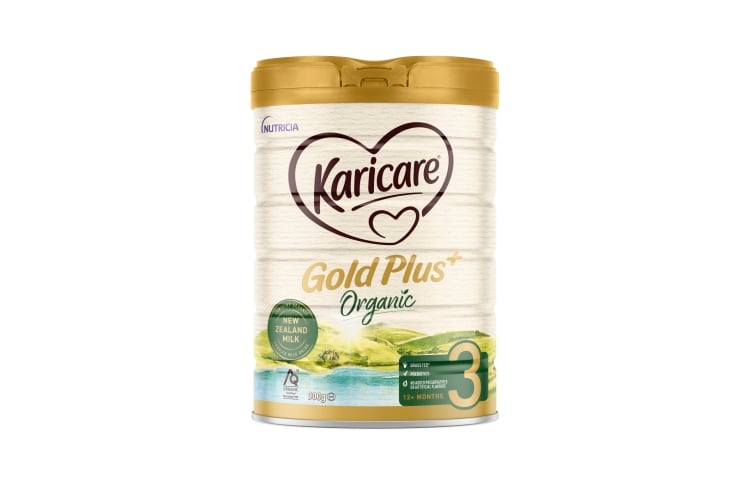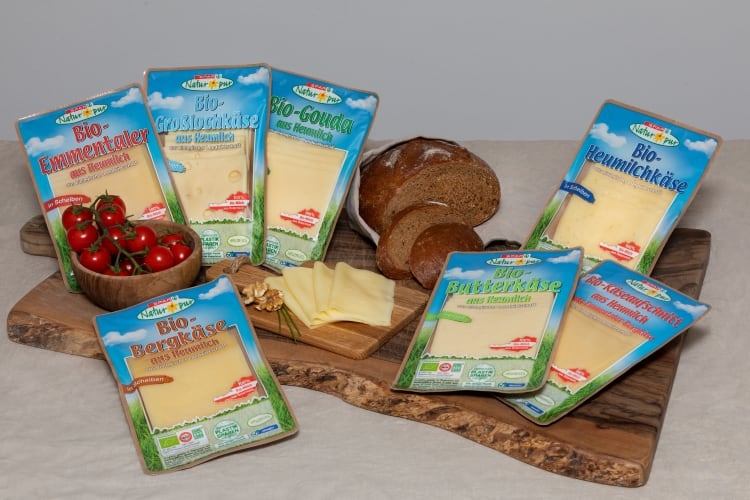Carbery Group launches new cheese brand for ingredient and foodservice sectors
International dairy, nutrition and flavor company Carbery Group is launching Carbery Dairy, a new cheese brand, specifically for the ingredients and food service markets in Europe and Asia.
The range includes natural cheddar, ‘Cheese Extra’ – functional reduced fat cheese, speciality cheeses and a new range of pasta filata, including mozzarella and grilling cheese. The cheeses are designed for a range of applications including pizza, baking, ready meals, sauces, seasonings and snacks.
In 2018, the farmer-owned cooperative announced its intention to diversify its cheese product range into pasta filata and target new markets with new products and applications, including expanding in Asia. The expansion, underpinned by a €78m ($93m) investment in a new facility in West Cork, Ireland, is now almost complete, with output set to increase from just over 50,000 tonnes per annum to 64,000 tonnes.
CEO of Carbery Group Jason Hawkins said, “We have been implementing a strategy for a number of years now to diversify and grow our products, and therefore our customer base. Our extensive market research has shown us that demand in Asia for dairy products and particularly cheese is set to grow. We believe that our heritage and expertise in dairy, combined with our talented team of researchers, food scientists and cheese experts, have culminated in this exceptional cheese brand that we hope will inspire new and existing customers to create market-winning products.”
The varieties of cheese on offer through Carbery Dairy include Pasta Filata (mozzarella and grilling cheese); natural Cheddar (mild, medium, mature and vintage); Cheese Extra (a variety of functional, high protein, reduced fat cheeses); and speciality cheeses (Italian style and Inclusion cheese with flavors such as smoked, chilli, fajita and black pepper).
The Professional Range, which includes all of the cheese varieties on offer through Carbery Dairy, has been specifically developed to meet the needs of chefs in the food service sector. The cheeses have been tested in real-life food service settings to ensure they perform well under different cooking and baking conditions. They are also available in different formats, to suit the requirements of different kitchen capabilities.
Orlaigh Matthews, marketing manager for cheese, said, “We’re excited to be entering the food service market with our Carbery Dairy range of high-quality cheeses. In developing the range, we drew on the creative and practical expertise of our chefs, who collaborate extensively with our customers to ensure the cheeses are suited to professional kitchens. Together with our cheesemakers and R&D teams, our chefs have created exciting recipes to satisfy consumer demands around the world. We hope food service suppliers enjoy creating delicious dishes for their customers that showcase the very best in Irish grass-fed cheese.”
Mondi partners with SalzburgMilch and SPAR to reduce plastic waste from food packaging
Austrian-headquartered packaging and paper manufacturer Mondi Functional Paper & Films is launching a fully recyclable 80% paper-based packaging solution for cheese and cold meats.
The new packaging, which is suitable for existing filling lines, will reduce plastic usage for Austrian dairy producer SalzburgMilch by approximately 40 tonnes per year, compared to its previously used rigid plastic trays.
Mondi has launched its PerFORMing removable in partnership with SalzburgMilch for the brand SalzburgMilch Premium and the premium own-brand SPAR Natur*pur organic cheese slices. The shallow paper tray combines the recyclability of paper with the essential barrier properties of a thin plastic coating to keep food fresh and avoid waste.
Mondi released its original PerFORMing range in 2019 and has continued to work on making it more sustainable. The original product could be recycled in Austrian paper recycling streams. The updated product now consists of paper and fully removable plastic, which can be separated from the paper tray, allowing for 100% paper recycling across Europe.
The product is made in Austria, meaning transportation is kept to a minimum and the overall carbon footprint is reduced. The base paper for the tray is Advantage Formable, made predominantly from locally-sourced wood and produced by Mondi Frantschach, while the trays are processed and coated by Mondi Zeltweg, both located in Austria.
PerFORMing removable is part of Mondi’s EcoSolutions approach to find the most sustainable and fit for purpose packaging for its customers with a focus on replacing, reducing, and recycling. SalzburgMilch and SPAR are using Mondi’s product, which results in 70% less plastic used compared to plastic trays, for their 175g packets of sliced cheese, which are available in SPAR stores across Austria.
Switching to paper-based packaging offers environmental benefits including being a renewable resource with higher recycling rates than other packaging materials.
Marko Schuster, COO of Mondi, said, “Food waste is a global issue and we want to play our part to ensure our packaging is Sustainable by Design and addresses the issue of food loss. We always had an aspiration to continue improving our PerFORMing range. The PerFORMing removable uses paper where possible, significantly reducing the carbon footprint, and plastic when useful, to extend the shelf life and help prevent food waste. As both components can easily be separated and the paper fully recycled across Europe, this is a big step for us with waste streams differing vastly across regions. We will continue to further develop our products as we work with partners to create a circular economy for sustainable packaging.”
Andreas Gasteiger, managing director of SalzburgMilch, said, “Climate and environmental protection has always been a very important issue. We have already saved over 100 tonnes of plastic through numerous measures in the last three years and we are not resting on our laurels, which is why we have made further improvements to our new paper trays.”
Dr Gerhard Drexel, SPAR CEO, said, “Our initiative 'Save plastics together with SPAR' aims to avoid plastics completely or reduce them significantly. Mondi's paper-based and recyclable packaging creates innovative solutions for fresh products that could not be sold without packaging.”
Butlers Farmhouse Cheeses launches fully recyclable cheese packaging
Butlers Farmhouse Cheeses has developed recyclable polyethylene (PE) packaging for its hard, soft and blue cheeses, making it the first cheesemaker in the UK to have a fully recyclable British cheeseboard.
Butlers has invested in its packaging strategy and has worked over the last 12 months to bring the new packaging to retailers. M&S will stock 'This is Proper', fully recyclable goats’ cheese from November 4, 2020.
Butlers’ PE packaging can be recycled as one unit without affecting shelf life. Cheese packaging is traditionally made up of several different polymers that make it difficult to recycle. Butlers’ new packaging is a single polymer, including the label and barrier (with different barriers developed for the type of cheese), meaning it can be widely recycled.
The company said sustainable cheese packaging does not have to be and should not be a goal for five years’ time, or for the 2022 plastic tax levy, and that it was not interested in short-term solutions like reduced plastic or TerraCycle recycling initiatives that rely on the end consumer.
Butlers is in phase two trials for its packaging, using natural alternatives such as seaweed.
Matthew Hall, owner at Butlers Farmhouse Cheeses said, "We now have a credible solution for the shopper that is doing the right thing for the environment. Transforming our packaging now, for the future, is a big step forward, and anyone wanting to leverage the growth within speciality cheese with a range of farmhouse cheeses that deliver great taste, real provenance and game-changing packaging, should get in touch."
Danone’s Karicare milk formula brand commits to carbon neutrality
Danone has announced its New Zealand milk formula brand, Karicare, will achieve carbon neutrality at each stage of the product lifecycle by 2030.
Karicare will join other Danone brands – such as Horizon Organic, which has also committed to becoming carbon neutral, and evian and Volvic, which are already carbon neutral – on Danone’s journey to becoming a zero-net carbon company by 2050.
Karicare’s journey to carbon neutrality is aided by its production in New Zealand, which also has an ambition to be net zero on greenhouse gas emissions by 2050.
“At Danone, our core belief is that the health of the planet and health of people are interconnected. That’s why we’re committed to taking real steps that help us bring our products to market in a way that minimizes any impact on climate change, including transitioning production of our milk formula products to practices that are more sustainable,” said Rodrigo Lima, managing director, Nutricia Oceania.
Danone said it will also work with its New Zealand suppliers and farmers to foster regenerative agricultural practices and improve soil health, continue to invest in decarbonization of operations and focus on packaging circularity.
Karicare carbon emissions associated with operations is a significant area of focus, the company said. This includes installing a biomass boiler to provide renewable heat at its South Island spray drying facility in Balclutha. Announced in July 2019, the NZ$30m boiler will be operational in 2021 and will eliminate around 20,000 tonnes of CO2 emissions per year.
Danone will also move to 100% renewable electricity for all its New Zealand plants next year. Between the move to renewable energy and biomass-based heating, the total operational CO2 emissions at the Balclutha plant will be reduced by 95%.
Danone’s ambition is to make packaging 100% circular across all its brands. This means eliminating unneeded packaging, designing for recycling, reusing or compositing and ensuring that the material produced stays in the economy and doesn’t become waste or pollution. A circular approach to packaging reduces carbon emissions due to greater reuse and recycling, leading to less reliance on virgin materials.
Karicare’s packaging across the total portfolio has a high level of recyclability due the use of tin plate in its cans and the widespread use of recyclable plastics for items such as scoops and snap-seal lids. Consistent with Danone’s global ambition, all Karicare’s packaging will be either recyclable, reusable or compostable by 2025.
The carbon neutral journey for Karicare will commence with the newly launched Karicare Gold Plus+ Organic, which will be certified carbon neutral in 2022. All other products in the Karicare range will be progressively certified up to 2030, at the latest.
“Danone’s approach to carbon neutrality is to focus on reductions first and foremost,” Lima said.
“We continuously act together with our partners to reduce our emissions in agriculture, operations and packaging, then taking responsibility for offsetting remaining emissions to achieve a carbon neutral position. With carbon neutral Karicare, we’re providing consumers with a more sustainable option and giving them the opportunity to choose a better future for their family.”




